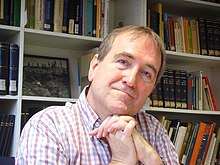Chris Stringer
Chris Stringer | |
|---|---|
 Stringer in 2012 | |
| Born | 1947 (age 76–77) |
| Alma mater | University College London Bristol University |
| Scientific career | |
| Institutions | Natural History Museum, London |
| Thesis | A multivariate study of cranial variation in middle and upper Pleistocene human populations (1974) |
| Doctoral advisor | Jonathan H. Musgrave |
Christopher Brian "Chris" Stringer FRS (born 1947), is a British anthropologist.
Biography
Born into a working-class family in the East End of London, Stringer's interest in anthropology began in primary school, where he undertook a project on Neanderthals.[1] Stringer studied anthropology at University College London,[2] holds a PhD in Anatomical Science and a DSc in Anatomical Science (both from Bristol University.[3]
Stringer is a Research Leader in Human Origins at the Natural History Museum, director of the Ancient Human Occupation of Britain project. He is also a Fellow of the Royal Society and Honorary Fellow of the Society of Antiquaries. He won the 2008 Frink Medal of the Zoological Society of London and the Rivers Memorial Medal from the Royal Anthropological Institute in 2004[4]
He has three children and lives in London.
Research
| Part of a series on |
| Anthropology |
|---|
 |
Stringer is one of the leading proponents of the recent African origin hypothesis or ″Out of Africa″ theory, which hypothesizes that modern humans originated in Africa over 100,000 years ago and replaced, in some way, the world's archaic humans, such as Homo floresiensis and Neanderthals, after migrating within and then out of Africa to the non-African world within the last 50,000 to 100,000 years. He always considered that some interbreeding between the different groups could have occurred, but thought this would have been trivial in the big picture. However, recent genetic data show that the replacement process did include some interbreeding. In the last decade he has proposed a more complex version of events within Africa, which he has termed ″coalescent African origin″.
He has also directed three phases of the Ancient Human Occupation of Britain project since 2001. This consortium has been reconstructing and studying the episodic pattern of human colonisation of Britain during the Pleistocene.
Publications
Papers
- C.B. Stringer; P. Andrews (1988). Genetic and Fossil Evidence for the Origin of Modern Humans. Vol. 239. pp. 1263–1268. doi:10.1126/science.3125610. PMID 3125610.
{{cite book}}:|journal=ignored (help) - C.B. Stringer (2002). Modern human origins – progress and prospects. Vol. 357. pp. 563–579. doi:10.1098/rstb.2001.1057.
{{cite book}}:|journal=ignored (help)
Books
- Stringer, Chris, ed. (1981). Aspects of human evolution: Symposium on human evolution, January 1980. London: Taylor & Francis. ISBN 0-85066-209-5.
- Stringer, Chris (1986). "The credibility of Homo habilis". In B. Wood, L.; Martin, P. Andrews (eds.). Major topics in primate and human evolution. p. 266. ISBN 978-0-521-11338-0.
- Chris Stringer (1989). "Neandertals, their contemporaries and modern human origins". In Giacomo Giacobini (ed.). Hominidae: Proceedings of the 2nd International Congress of Human Paleontology. Turin, September 28 – October 3, 1987. pp. 351–356. ISBN 88-16-28026-3.
- Peter Andrews; Chris Stringer (1989). Human Evolution: An Illustrated Guide. Cambridge: Cambridge University Press. ISBN 0-521-38824-4.
- Paul Mellars & Chris Stringer (Editors) (1989). The Human Revolution: Behavioural and Biological Perspectives on the Origins of Modern Humans. Princeton University Press. ISBN 978-0-691-08539-5.
{{cite book}}:|author=has generic name (help) - Chris Stringer; Robin McKie (1997). African Exodus. The Origins of Modern Humanity. New York: Henry Holt. ISBN 0-8050-2759-9.
- Christopher B. Stringer, R.N.E. Barton, J.C. Finlayson (Editors) (2000). Neanderthals on the Edge: Papers from a Conference Marking the 150th Anniversary of the Forbes' Quarry Discovery, Gibraltar. Oxford: Oxbow Books. ISBN 978-1-84217-015-1.
{{cite book}}:|author=has generic name (help)CS1 maint: multiple names: authors list (link) - "Introduction to the fiftieth anniversary edition of The Piltdown Forgery" (pp. vii–x | and "Afterword: Piltdown 2003" (pp. 188–201). In The Piltdown Forgery By J. S. Weiner (2003) Oxford: Oxford University Press. ISBN 0-19-860780-6
- Chris Stringer; Peter Andrews (2005). The Complete World of Human Evolution. London & New York: Thames & Hudson..[5] ISBN 0-500-05132-1
- Chris Stringer (2007). Homo britannicus. The Incredible Story of Human Life in Britain. London: Penguin. ISBN 0-14-101813-5.[6]
- Chris Stringer (2011). The Origin of Our Species. London: Allen Lane. ISBN 978-1-84614-140-9., published in the United States in 2012 retitled as Lone Survivors: How We Came to Be the Only Humans on Earth. London: Times Books. ISBN 978-0805088915.
References
- ^ Ryan, Hannah F. "Professor Chris Stringer". International Journal of Student Research in Archaeology. Retrieved 12 October 2016.
- ^ Stringer, C. (2006), Homo britannicus, p. 183, London: Penguin Books, ISBN 978-0-14-101813-3
- ^ University of Bristol Alumni – Faculty of Medical and Veterinary Sciences Archived 2012-03-28 at the Wayback Machine
- ^ List of recipients of Rivers Memorial medal
- ^ "The Complete World of Human Evolution". The Natural History Museum. Archived from the original on 20 June 2006. Retrieved 19 January 2009.
{{cite web}}: Unknown parameter|deadurl=ignored (|url-status=suggested) (help) - ^ "Stringer wins Kistler Book Award". The Natural History Museum. 13 March 2008. Archived from the original on 25 July 2009. Retrieved 19 January 2009.
{{cite news}}: Unknown parameter|deadurl=ignored (|url-status=suggested) (help)
External links
- Prof Chris Stringer's Home Page at Natural History Museum
- Natural History Museum Homo britannicus news (11 October 2006)
- AHOB Home Page
- World Land Trust Supporter news (Wednesday, 25 June 2008)
- Homo britannicus Archaeology award (13 November 2008)
- RESET Project
- Human Evolution book news (19 May 2005)
